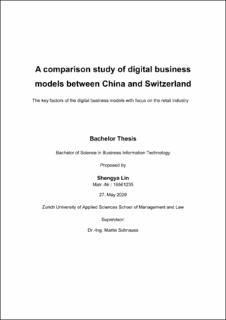Please use this identifier to cite or link to this item:
https://doi.org/10.21256/zhaw-21839Full metadata record
| DC Field | Value | Language |
|---|---|---|
| dc.contributor.advisor | Schnauss, Martin | - |
| dc.contributor.author | Lin, Shengya | - |
| dc.date.accessioned | 2021-02-25T09:16:33Z | - |
| dc.date.available | 2021-02-25T09:16:33Z | - |
| dc.date.issued | 2020 | - |
| dc.identifier.uri | https://digitalcollection.zhaw.ch/handle/11475/21839 | - |
| dc.description.abstract | Digitisation involves changes in different areas of society and defines the new direction of businesses. The most visible field of which is the retail industry. Moreover, technology-oriented business models become a modern and preferable way among consumers. Notably, China’s high GDP growth is highly related to this development because digital retail already penetrated daily life and formed a business eco-system. In contrast, the effect of those business models has not yet overtaken the Swiss economy, since the traditional market is still dominant regarding its profound economy structure. However, new emerging technologies may have the chance to lead another revolution and hence bring the large potential of digital business opportunity globally. This Bachelor thesis aims to compare the business environment of digital business models in the retail industry between China and Switzerland. It discusses different macroenvironment perspectives to scrutinise the key factors. This thesis approaches the research question with the qualitative method. The empirical part consists of a comprehensive literature review and interviews with experienced cross-country experts in China and Switzerland. Further-more, the professional literature of both countries primarily contributes to the development of the theoretical background. In addition, interviews with Mr. He (CEO of World Internet of Thing Conference), Mr. Berner (service manager from Huawei) and Dr. Wu (graduated from UZH) accomplished this study. The empirical studies reveal the different approaches of digital transformation in the retail industry in China and Switzerland. China presents its reliability of economic development on technological development whereas Switzerland does on its legal framework. Despite, the comparison and interviews illustrate the similarities in their macroenvironment of implementing digitalisation. The acceptance of technology in the two countries influenced the transformation process in their respective retail industries. Similarly, cybersecurity has been the main concern to prevent rapid digitalisation. Exceptionally, there are numbers of organisations that considered the transformation as a great option to resolve the security issue. Furthermore, new digital retail businesses depend on direct and decentralised communications between physical shops and online distributions in order to remain sustainable. Collectively, the key factors for accelerating the digital business models in the retail industry are the acceptance of technology, security and online-offline connectivity. Due to the time and scope limitation, this thesis focuses on the macroenvironment of the retail industry regarding digital business models. Therefore, this study provides insightful instructions to future digital business models comparative studies between China and Switzerland such as microenvironment, customer perspectives and the impact of the economic models towards competitive advantages. Moreover, this study also serves as an informative foundation regarding the collaboration and M&A activities on technologies between both countries. | de_CH |
| dc.format.extent | 63 | de_CH |
| dc.language.iso | en | de_CH |
| dc.publisher | ZHAW Zürcher Hochschule für Angewandte Wissenschaften | de_CH |
| dc.rights | https://creativecommons.org/licenses/by/4.0/ | de_CH |
| dc.subject.ddc | 337: Weltwirtschaft und Handel | de_CH |
| dc.title | A comparison study of digital business models between China and Switzerland : the key factors of the digital business models with focus on the retail industry | de_CH |
| dc.type | Thesis: Bachelor | de_CH |
| dcterms.type | Text | de_CH |
| zhaw.departement | School of Management and Law | de_CH |
| zhaw.publisher.place | Winterthur | de_CH |
| dc.identifier.doi | 10.21256/zhaw-21839 | - |
| zhaw.originated.zhaw | Yes | de_CH |
| Appears in collections: | BSc Wirtschaftsinformatik | |
Files in This Item:
| File | Description | Size | Format | |
|---|---|---|---|---|
| Bachelor_Thesis_WIN_Linshe01.pdf | 1.33 MB | Adobe PDF |  View/Open |
Show simple item record
Lin, S. (2020). A comparison study of digital business models between China and Switzerland : the key factors of the digital business models with focus on the retail industry [Bachelor’s thesis, ZHAW Zürcher Hochschule für Angewandte Wissenschaften]. https://doi.org/10.21256/zhaw-21839
Lin, S. (2020) A comparison study of digital business models between China and Switzerland : the key factors of the digital business models with focus on the retail industry. Bachelor’s thesis. ZHAW Zürcher Hochschule für Angewandte Wissenschaften. Available at: https://doi.org/10.21256/zhaw-21839.
S. Lin, “A comparison study of digital business models between China and Switzerland : the key factors of the digital business models with focus on the retail industry,” Bachelor’s thesis, ZHAW Zürcher Hochschule für Angewandte Wissenschaften, Winterthur, 2020. doi: 10.21256/zhaw-21839.
LIN, Shengya, 2020. A comparison study of digital business models between China and Switzerland : the key factors of the digital business models with focus on the retail industry. Bachelor’s thesis. Winterthur: ZHAW Zürcher Hochschule für Angewandte Wissenschaften
Lin, Shengya. 2020. “A Comparison Study of Digital Business Models between China and Switzerland : The Key Factors of the Digital Business Models with Focus on the Retail Industry.” Bachelor’s thesis, Winterthur: ZHAW Zürcher Hochschule für Angewandte Wissenschaften. https://doi.org/10.21256/zhaw-21839.
Lin, Shengya. A Comparison Study of Digital Business Models between China and Switzerland : The Key Factors of the Digital Business Models with Focus on the Retail Industry. ZHAW Zürcher Hochschule für Angewandte Wissenschaften, 2020, https://doi.org/10.21256/zhaw-21839.
Items in DSpace are protected by copyright, with all rights reserved, unless otherwise indicated.